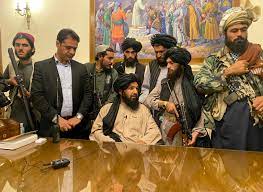The culprit was the Islamic State’s neighborhood establishment, now and then called ISIS-K or IS-K, for the gathering’s Khorasan branch in Afghanistan. Some have additionally tried to fault the Taliban, who control Kabul and are answerable for the aggressors’ getting past the designated spots that prompted the edge of the air terminal.
The Taliban have besieged groups in Kabul, and among their individuals are numerous who accept that Americans and their colleagues merit passing and then some. Indeed, even senior U.S. authorities befuddle these gatherings: Last week, previous Defense Secretary and CIA Director Leon Panetta revealed to NPR he anticipated that the Taliban should “give a place of refuge to al-Qaeda, for ISIS, and for psychological oppression overall.”
However the Taliban guarantee that 28 of their own troopers were killed in the impact. Furthermore, similarly as we ought to recollect the Taliban’s record, and not credit too effectively their cases to have changed, we ought to likewise note exactly how profoundly these gatherings scorn one another—and why ISIS-K has each impetus to explode Afghans and Americans under the Taliban’s watch.
At the point when the Taliban terminated Kabul this month, they avoided quick responses against their foes, with one special case: “The solitary known execution since the capital’s takeover was of Abu Omar Khorasani, the former head of Islamic State in South Asia,” The Wall Street Journal reports. Khorasani “was taken by the Taliban from an Afghan government jail and killed on the spot.”
For what reason can’t these jihadis simply get along and turn their fire mutually against the United States? The profound explanation is philosophical. The Taliban’s originator, Mullah Omar, styled himself “Emir of the adherents,” a term comparable in Islam’s traditional period to caliph.
Certain guidelines apply to caliphs, and preeminent among them is that there can be just each in turn. Others incorporate the prerequisite that the caliph be actually entire and slipped from the clan of the Prophet Muhammad.
Like the vast majority of the first era of the Taliban, Omar was somewhat dissected (missing an eye, for his situation), and slipped not from an Arab clan but rather from a Pashtun group. Gracious, and one more prerequisite of the caliph is that he should be alive. Omar passed on in 2013, yet the Taliban pulled a Weekend at Bernie’s and lied about it for a very long time.
The Islamic State, noticing these lacks, named its own caliph in 2014 when it assumed responsibility for parts of Syria and Iraq, and constantly ridiculed the Taliban for being defector hillbillies out of consistence with even the most fundamental components of Islam.
One can only with significant effort excuse or withdraw abuses, for example, these. Nor would one be able to reclaim what followed: a hard and fast military test by the Islamic State to the Taliban’s incomparability as Afghanistan’s Islamist guerrilla power. These two groups battled a conflict—and surprisingly however the Taliban had a decades-in length head start, the opposition was a nearby one in specific regions, especially eastern Afghanistan.
The U.S. interceded to help the Taliban, under the hypothesis that basically the hillbillies were intrigued uniquely in Afghanistan, though the Islamic State would explode each statehouse and disco on Earth in the event that it got the opportunity.
At the point when the Taliban took Kabul, ISIS-K stopped its tasks. Keen onlookers noticed the respite, which glances all things considered like a time of vital reassessment, to sort out some way to hit both of the Islamic State’s foes in a solitary blow.
The Taliban have reported, in word and in real life, that their most elevated need is support of public request and holding cash and individuals back from escaping the country. The American need is an organized exit for its residents and a few Afghans to whom the U.S. owes an exceptional obligation.
The Taliban, for every one of their shortcomings, appear to have intuited the weakness at the air terminal and attempted to keep the groups around the space little. In any case, the possibility of their standard is so startling—and all things considered—that the crowds holding back to be cleared developed thick around the air terminal entryways at any rate, and the Americans couldn’t or would not whisk them away quick enough to hold them back from introducing a delightful objective.
“It is in light of a legitimate concern for the Taliban that ISIS-K doesn’t metastasize past what it is,” President Joe Biden said in his public interview yesterday. These words are spot on, and in the transient the Taliban are America’s partners in completing its clearing.
For an Afghan, however, think about what the besieging forecasts. At the point when the Soviets pulled out from Afghanistan in 1989, the public authority they left behind fell quickly, and throughout the following decade, different quarreling groups decreased the whole country to rubble.
The possibility of Taliban rule, or even Islamic State rule, is adequately awful. Surprisingly more terrible is the guarantee that Afghanistan’s numerous groups, some furnished and upheld from abroad, will continue challenging each other’s strength by exploding blameless individuals.
With a solitary blast, ISIS-K has guaranteed that the Americans will leave the country with new blood on their garbs, and has declared to the excess Afghans that what comes next will be far more terrible.
 Magazine Today
Magazine Today

